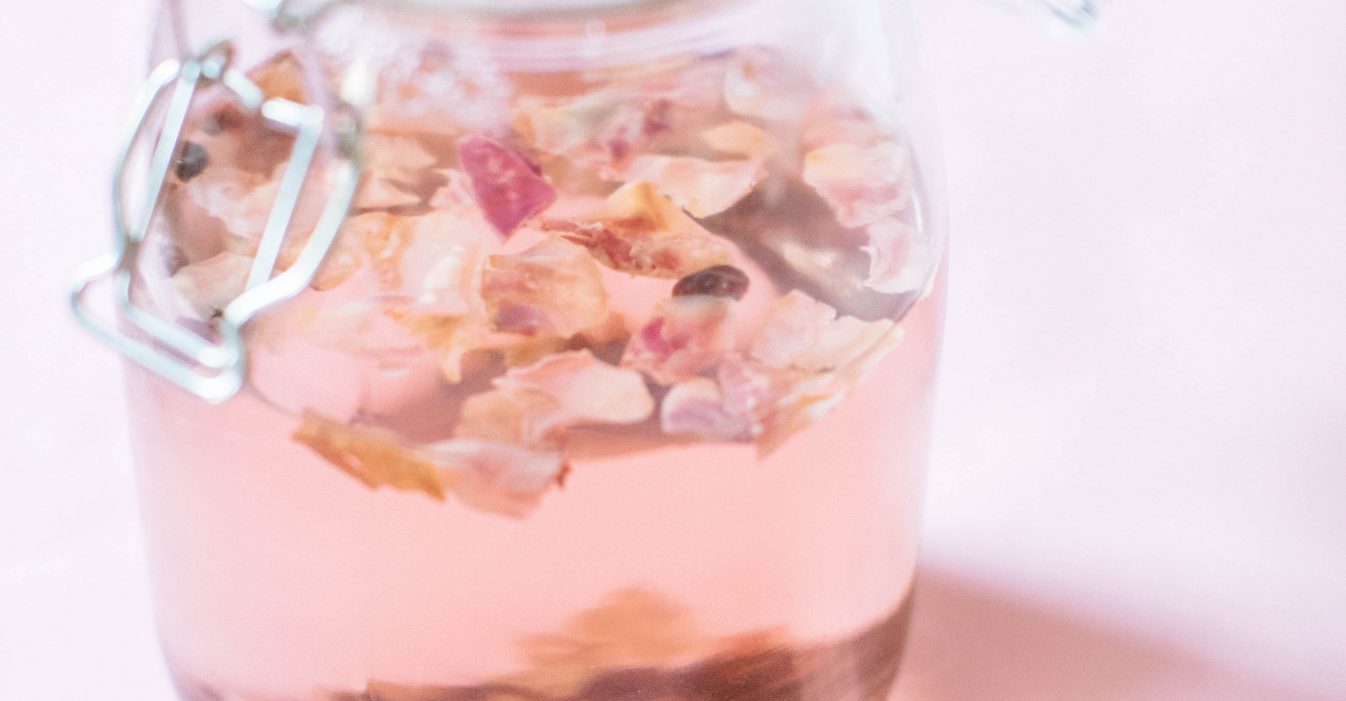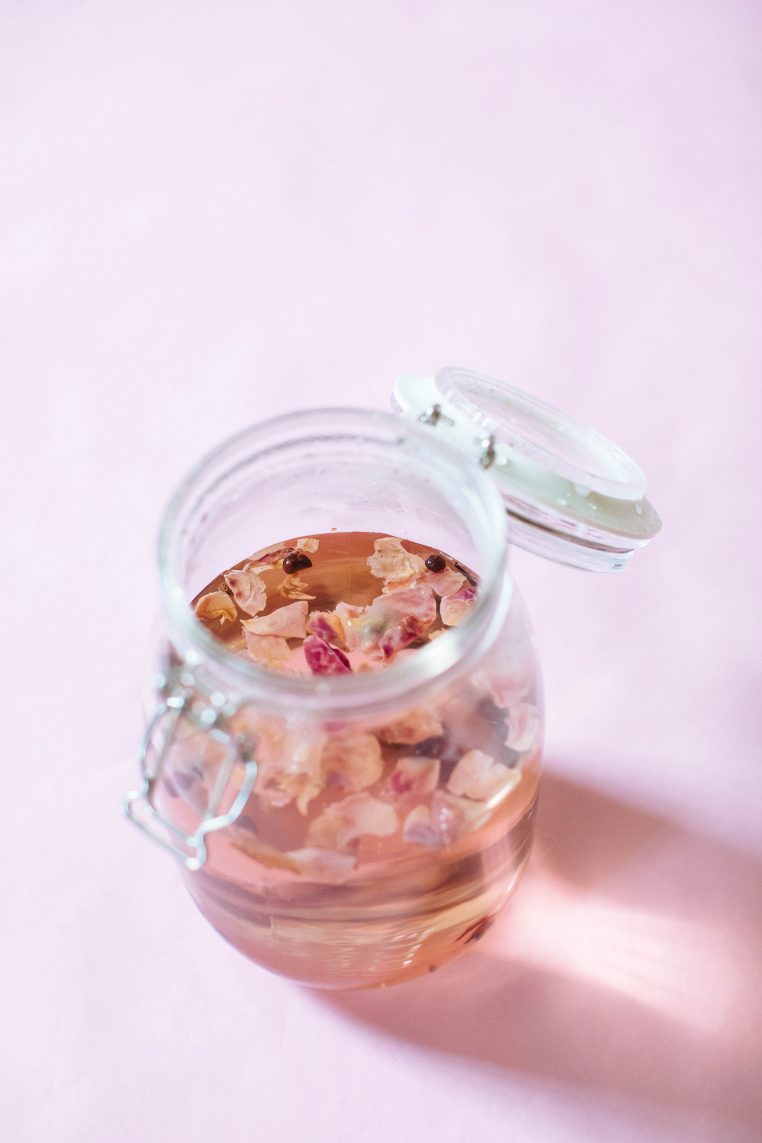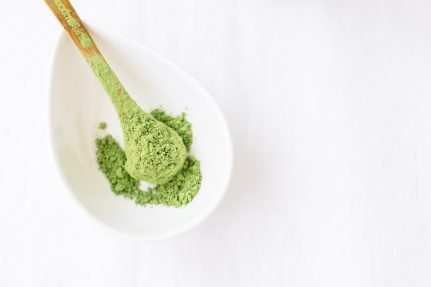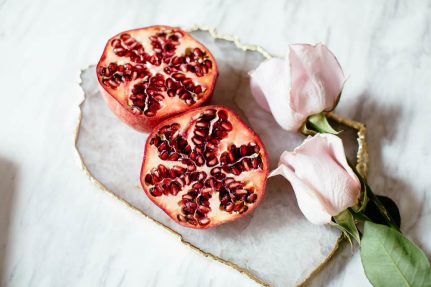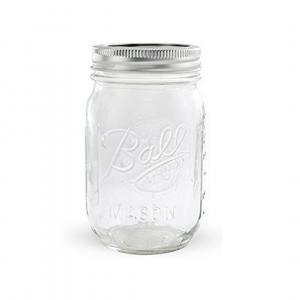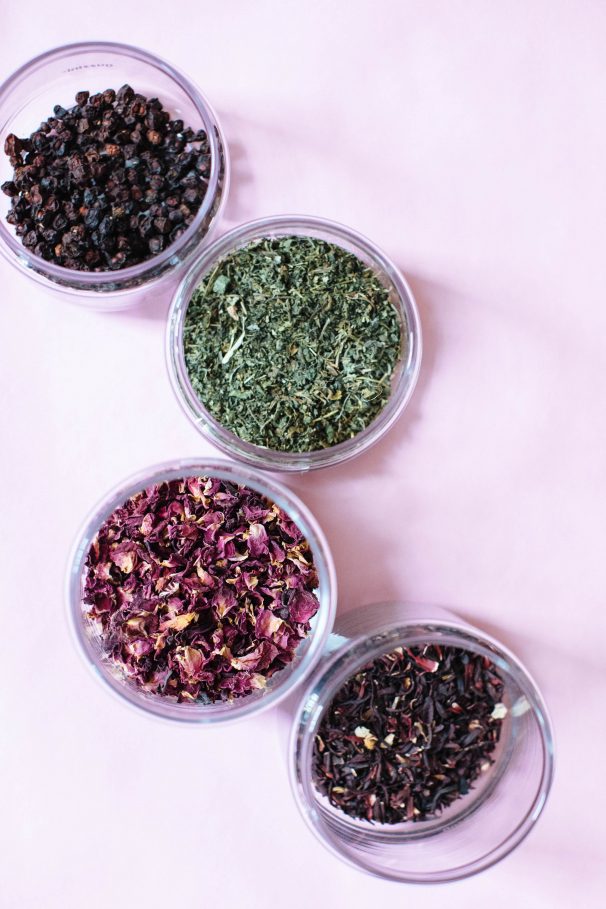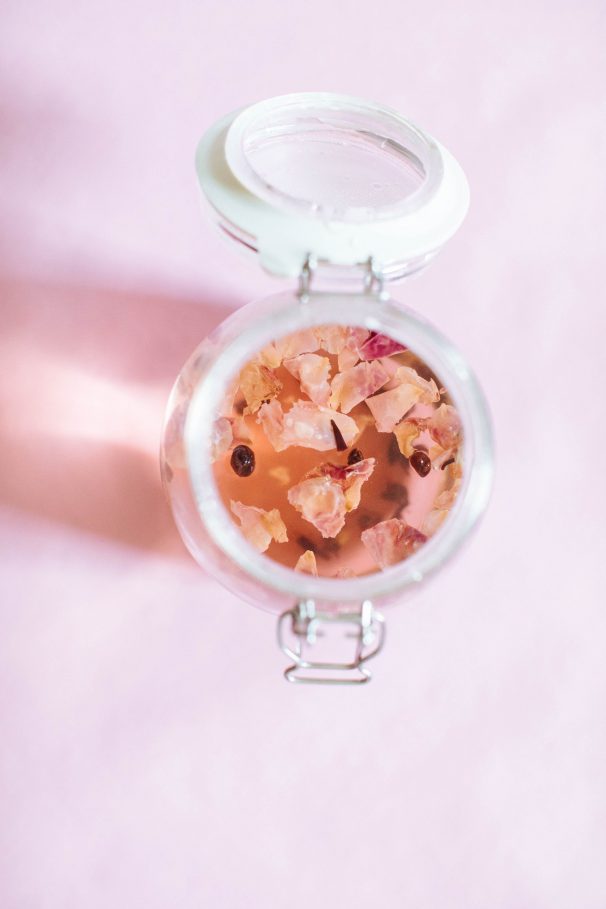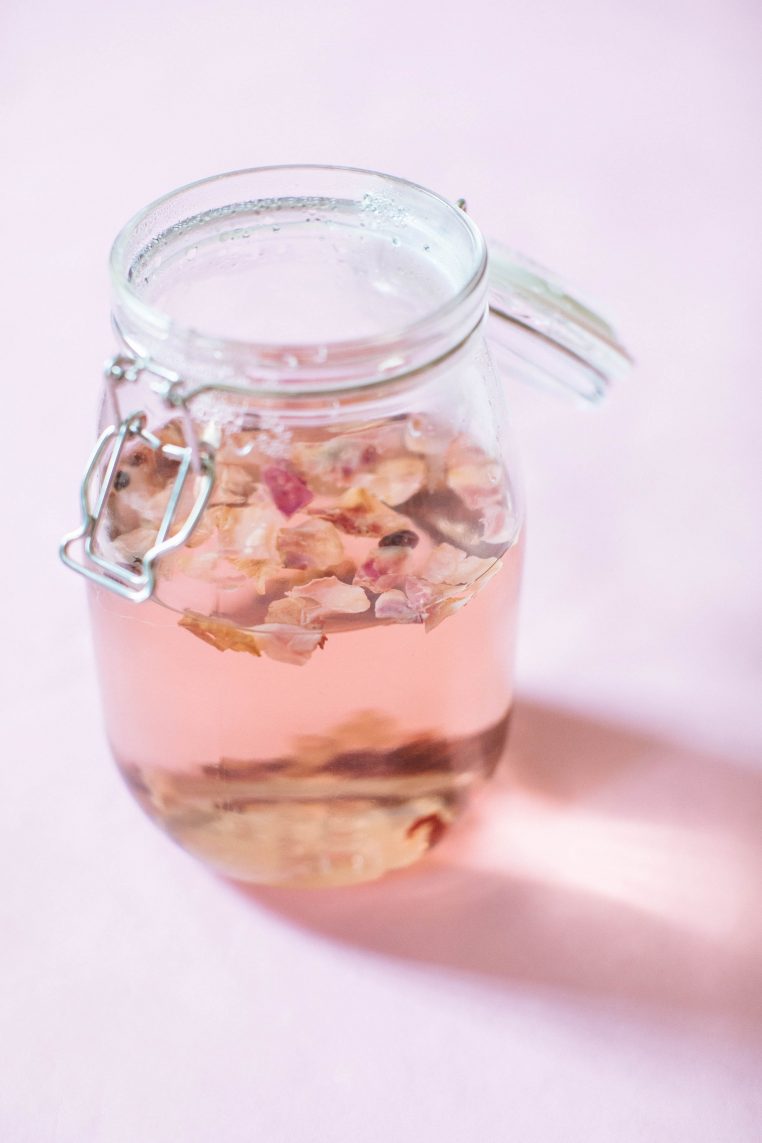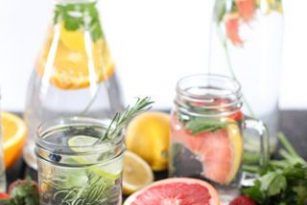One of the best ways to help yourself drink more water is to infuse more flavor with herbs.
The benefits of sipping more water throughout your day are endless. Water helps your body function optimally on a cellular level, keeps skin hydrated, reduces lethargy, improves digestion—and the list goes on. Think of water as one of the most important fuels that keep your body running, which is why it’s so key—plus it makes up most of the matter in our bodies, too.
Besides keeping you hydrated, water can also reduce your overall calorie intake, as well as your sugar, fat, and sodium consumption, according to studies (1). It can also help you push through a tough workout. On the other hand, dehydration can lead to a decrease in concentration, more headaches, and it can even crush your mood (2).
I’ve heard from many clients, friends, and readers that it can be tough to consistently drink plain water. That’s precisely why it’s nice to give it a little extra kick, so you keep you coming back for more. Here’s where herbs come in—they pack that tasteful punch, and even better, boost the nutrients while you drink water. Let’s talk about why you should make herbal infused water recipes and how to do so successfully.
Why Make Herbal Infused Water Recipes?
As I mentioned, herbs bring lots of flavor to plain old H2O. They have a welcoming taste that likely keeps you wanting more of them (and that means you’ll stay hydrated), and they don’t add extra calories. To top off their advantages, herbs also bring in their own set of health benefits. Here, I offer some top herbs to infuse in your water and why they’re so good for you.
The Best Herbs to Infuse Your Water
To add some zing to your plain glass of H2O, simply add fresh or dried herbs to an airtight container of water. This could be a pitcher or a large mason jar. Let it sit in the refrigerator for at least 10 minutes (the longer you wait, the stronger the flavor), and then drain the ingredients and sip away.
As for what to add, here are some of my favorite herbs:
Schisandra Berry
Often used in Chinese medicine, this berry adds a slightly sweet flavor while providing major health benefits. It comes in a powered, pill, extract, or capsule form and you’ll get lots of antioxidants from it, which means it helps fight free radicals in the body. This berry also helps reduce inflammation, provides potential anti-cancer properties and assists in fighting off illness. It might even help keep your skin clear (3).
You’ll love the flavor of the Schisandra berry if you also like goji berries, with a hint of rosewater. Mix it with some grapefruit for the satisfying combo of sweet and bitter.
Fennel
Fennel provides a slew of good-for-you nutrients that’ll keep your whole body healthy. It’s high in vitamin C, potassium, and magnesium, as well as calcium and iron. One cup also has two grams of filling fiber.
The licorice-like flavor of fennel pairs perfectly with citrus fruits, like lemon.
Nettle
Stinging nettle is a plant in which people use the leaves for medicinal purposes. Though it needs more research, potential effects include anti-inflammatory properties and alleviating symptoms of arthritis. It’s also known as a diuretic, meaning it makes you urinate more often.
With a similar taste to spinach, nettle gives your water that fresh green flavor. Mix it with berries for an even better sip.
Dandelion herbs
A trendy herb these days thanks to it’s potential to help digestion, dandelion has been touted as a way to lower the risk of several diseases, too. One study discusses its potential to help those with type 2 diabetes (while results seem promising, more research is needed) (4). These effects likely come from its anti-hyperglycemic, anti-oxidative, and anti-inflammatory ingredients.
Similar to an endive, dandelion provides an earthy, bitter taste. Add a dash of sweetener, like Stevia, to lighten it up or a squeeze of lemon.
Peppermint
Besides making your breath smell fresh, adding peppermint leaves to your water means you’ll also likely gain antioxidants, plus antimicrobial and antiviral properties, which help you battle illnesses. It could also help keep things moving through your digestive tract (5). The smell may increase alertness, too (6).
Add a minty tea-like flavor to water with this wellness-enhancing herb. Throw in cherries, berries or cucumbers and watermelon to make your beverage even more delicious.
Ginger
There’s a reason people tell you to drink ginger ale when you’re feeling sick: Ginger can assist in relieving nausea (7). Throw a piece of this root in your water when you’re feeling under the weather. It also has those antioxidant and anti-inflammatory properties that help keep your body in a healthy state.
Ginger will give your water a sort of pungent, spicy note. To tame the bite, add a few lemon slices, too.
Rosemary
Another way to boost antioxidants and keep inflammation at bay: Add a few rosemary sprigs to your water. Though researchers have only done preliminary studies, this green herb could be good for those with Alzheimer’s disease or potential risk of the disease (8).
You’ll get a pine-tree-like taste from rosemary sprigs, which work nicely with cucumber or grapefruit slices to up the freshness.
How To Make Herbal Infusions
If making a large pitcher, use 1-gallon container which is recommended. Take 1/4 cup of the dried herb or mix of herbs you’re making the infusion with 2-3 cups of boiling water, steep covered for 15 minutes, strain the herbs (you can re-steep this mixture at least two more times to be resourceful!), and fill up the remainder of the pitcher with cold filtered water. Store the herbal infusion in a large airtight glass jar or pitcher for up to one week.
Where to Buy Herbs
Your local health food store or tea shop will likely have all of these herbs. You can also shop at your regular grocery store for things like rosemary and fennel. Traditional Medicinals is another great spot to search for the ingredients you need.
Other Uses for Herbs
Though dried herbs are great, you might want to buy a batch of fresh herbs. With the leftovers, you can use them in oils to add more flavor to things like meat and vegetables. Add a few fresh sprigs to your olive or avocado oil bottle and let it sit for a few days. It’s just that simple.
Share Your Herbal Infusions
Herb-infused water also makes for pretty pictures. Share your favorite recipes with the NS community using #nutritionstripped.
References
- R. An, J. McCaffrey. (2016, February). Plain water consumption in relation to energy intake and diet quality among US adults, 2005-2012.
- Armstrong LE, Ganio MS, Casa DJ, Lee EC, McDermott BP, Klau JF, Jimenez L, Le Bellego L, Chevillotte E, Lieberman HR. (2012, February.) Mild dehydration affects mood in healthy young women.
- Current knowledge of Schisandra chinensis (Turcz.) Baill. (Chinese magnolia vine) as a medicinal plant species: a review on the bioactive components, pharmacological properties, analytical and biotechnological studies.
- Fonyuy E. Wirngo, Max N. Lambert, and Per B. Jeppesen. (2016, Summer). The Physiological Effects of Dandelion (Taraxacum Officinale) in Type 2 Diabetes.
-
Inamori M, Akiyama T, Akimoto K, Fujita K, Takahashi H, Yoneda M, Abe Y, Kubota K, Saito S, Ueno N, Nakajima A. (2007, July). Early effects of peppermint oil on gastric emptying: a crossover study using a continuous real-time 13C breath test (BreathID system).
-
Raudenbush B, Grayhem R, Sears T, Wilson I.(2009). Effects of Peppermint and Cinnamon Odor Administration on Simulated Driving Alertness, Mood, and Workload.
- Ann M. Bode and Zigang Dong. (2011). The Amazing and Mighty Ginger.
- Solomon Habtemariam. (2016, January.) The Therapeutic Potential of Rosemary (Rosmarinus officinalis) Diterpenes for Alzheimer’s Disease.

